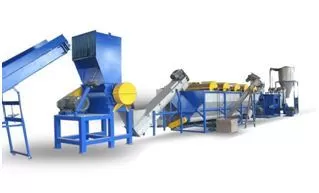Ever wondered how the environmental protection industry is shaping up, especially with the growing concern about plastic waste? You’re not alone. The increase in plastic waste has become a significant issue for businesses and governments alike. Understanding the current state and future trends of plastic recycling is crucial for anyone concerned about the environment.

The development of the environmental protection industry is closely linked with plastic recycling. Through innovation and technological advancements, we can significantly reduce the impact of plastic waste on the environment. Plastic recycling not only benefits the environment but also offers economic advantages.
If you’re keen to learn more about how plastic recycling works and where it’s headed, keep reading. I promise it will be an enlightening and engaging journey.
What is the Current State of the Environmental Protection Industry?
The environmental protection industry covers a broad range of areas, including waste management, renewable energy, air and water pollution control, and more. In recent years, the industry has received unprecedented attention and investment due to the increasing problems of global warming and environmental pollution.
Why is Plastic Recycling So Important?
Plastic is a durable material that is difficult to degrade. Every year, millions of tons of plastic waste end up in oceans and landfills, putting immense pressure on the environment.
By effectively recycling plastic, we can not only reduce environmental pollution but also save resources and lower energy consumption. It’s a win-win solution.
What Are the Main Methods of Plastic Recycling?
1. Mechanical Recycling
This is the most common method, which involves physically processing waste plastic into new plastic products. Mechanical recycling is suitable for various types of plastic and has a relatively simple process.
2. Chemical Recycling
Chemical recycling breaks down waste plastic into basic chemical components through chemical reactions, which can then be synthesized into new plastic. This method, although complex, can handle some types of plastic that mechanical recycling cannot.
3. Energy Recovery
Energy recovery converts waste plastic into energy through incineration or other methods. While effective in reducing plastic waste, it also produces some pollution and thus requires strict control and management.
What Are the Challenges of Plastic Recycling?
Despite the benefits of plastic recycling, there are several challenges in practice. For example, the wide variety of plastics requires different recycling methods.
Additionally, pollution control and resource consumption during the recycling process cannot be overlooked.
What Are the Future Trends?
With technological advancements, plastic recycling technologies are continually evolving. In the future, we might see more intelligent recycling systems and efficient chemical recycling technologies.
1. Intelligent Recycling Systems
Using artificial intelligence and automation technologies, we can significantly improve the efficiency and accuracy of plastic recycling. These systems can automatically identify and sort different types of plastic, greatly reducing labor costs.
2. New Materials
Scientists are researching new biodegradable plastics and more easily recyclable materials. These new materials not only make end-of-life processing easier but also reduce environmental impact during their lifecycle.
What Can We Do?
As businesses and individuals, we can all contribute to plastic recycling. Companies can invest in more advanced recycling technologies and equipment, while individuals can support environmental protection by sorting their waste and reducing the use of single-use plastics.
Through our collective efforts, we can create a cleaner and healthier planet for future generations.
Conclusion
The development of the environmental protection industry is closely tied to plastic recycling. Through innovation and technology, we can significantly reduce the environmental impact of plastic waste. Let’s work together to make a difference for the future of our planet.
That’s my take on the development of the environmental protection industry and plastic recycling. If you have any questions or need more information, feel free to reach out. Let’s join hands in making the world a greener place!
